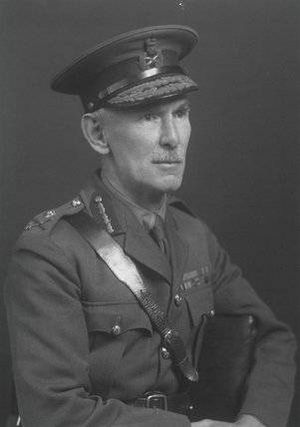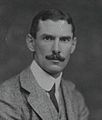Charles Gwynn facts for kids
Quick facts for kids
Sir Charles Gwynn
|
|
|---|---|

Sir Charles W. Gwynn KCB CMG DSO
|
|
| Born | 4 February 1870 County Donegal, Ireland |
| Died | 12 February 1963 Dublin, Ireland |
| Allegiance | |
| Service/ |
|
| Years of service | 1889–1931 |
| Rank | Major General |
| Unit | Royal Engineers |
| Commands held | Staff College, Camberley |
| Battles/wars | World War I |
| Awards | Knight Commander of the Order of the Bath Companion of the Order of St Michael and St George Distinguished Service Order |
Sir Charles William Gwynn (born February 4, 1870 – died February 12, 1963) was a brave British Army officer from Ireland. He was also a talented geographer, explorer, and writer. He wrote many books about military history and how armies fight.
Contents
Early Life and School Days
Charles William Gwynn was born in Ramelton, County Donegal, Ireland. His father, John Gwynn, was a professor at Trinity College, Dublin. His mother, Lucy Josephine, was the daughter of a famous Irish leader, William Smith O'Brien. Charles went to school at St. Columba's College, Dublin. Later, he studied at the Royal Military Academy, Woolwich. This is where future army officers learn their skills.
Becoming an Army Officer
Charles Gwynn joined the Royal Engineers as a second lieutenant in 1889. The Royal Engineers are a special part of the army. They focus on building things and mapping areas.
Adventures in Africa
In 1893, Charles Gwynn served in West Africa. He helped with military operations there. Later, in 1897, he joined the Intelligence Branch of the War Office. This group gathered important information for the army.
After the Sudan was taken back from the Mahdi, Gwynn did important survey work there. He helped map the land until 1904. He was promoted to captain and then to major. He also received an award, the Order of St Michael and St George (CMG). This was for his excellent work mapping the border between Ethiopia and Sudan.
Learning at Staff College
From 1905 to 1906, Charles Gwynn attended the Staff College, Camberley. This college trains officers to become leaders and strategists.
Teaching in Australia
In 1911, Major Gwynn went to Australia. He became an instructor at the Royal Military College, Duntroon. He taught young cadets about tactics, strategy, and military history. He even acted as the head of the college for a while.
World War I Service
When World War I started, Charles Gwynn returned to England. He wanted to fight in France. But instead, he was sent to the Middle East in 1915. He became a senior staff officer for the Australian 2nd Division at Gallipoli.
Later, he became the Chief of Staff for the II Anzac Corps. This was a very important leadership role. He served in this position until the war ended. He was present at the Battle of Messines in June 1917. His brother, Stephen Gwynn, and nephew, Dennis, also served in the war.
For his bravery and service, Gwynn received many honors. He was mentioned in official reports six times. He also received awards from Belgium and France. These included the Belgian Croix de Guerre and the French Légion d'honneur. In 1918, he was made a Companion of the Order of the Bath.
After the War
After World War I, Charles Gwynn continued to serve in important roles. In 1926, he became the Commandant of the Staff College, Camberley. This was a very high honor. He retired from the army in 1931. When he retired, he was made a Knight Commander of the Order of the Bath. This meant he was now called "Sir Charles Gwynn."
Life After the Army
After retiring, Sir Charles Gwynn became a writer. In 1934, he wrote a book called Imperial Policing. This book is still considered very important today. It teaches about how to handle smaller conflicts and wars.
Family Life
In 1904, Charles Gwynn married Mary Armstrong, who was also known as Molly. Molly had a daughter from her first marriage, named Margery. Charles and Molly did not have any children together. Molly passed away in 1951. Charles Gwynn spent his last years in Dublin, Ireland. He died in 1963 when he was 93 years old.
Personal Qualities
Sir Charles Gwynn was of average height and had a strong, thin build. He was known to have a slight stammer when he spoke.
Images for kids
 | Georgia Louise Harris Brown |
 | Julian Abele |
 | Norma Merrick Sklarek |
 | William Sidney Pittman |





